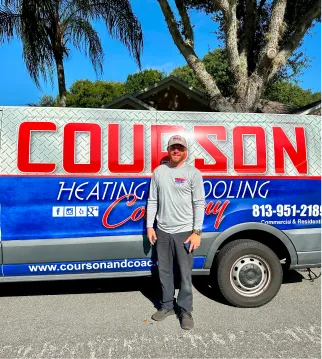Heating Repair in Tampa, FL
When your heating system stops working the way it should—whether it’s producing uneven temperatures, making unusual noises, or failing to heat altogether—it can disrupt comfort quickly. A malfunctioning heater often indicates deeper mechanical issues such as worn components, airflow blockages, ignition failures, or thermostat problems. Addressing these early helps prevent costly breakdowns and ensures your home stays warm when you need it most.
Professional heating repair in Tampa, FL, begins with a complete system evaluation. Technicians inspect essential components, verify proper airflow, check safety mechanisms, and test the system’s overall performance. Once the issue is identified, targeted repairs restore your system’s reliability and efficiency without unnecessary delays. This approach protects the lifespan of your equipment and helps reduce energy waste.
.webp)
Common Heating Problems We Repair
Heating systems can experience a wide range of issues, and a timely response helps prevent damage. Each home and system is different, so a detailed inspection ensures repairs are performed accurately.
Common issues include:
- Weak or inconsistent heat
- Unusual noises from the furnace or air handler
- Higher-than-expected energy bills
- Frequent on/off cycling
- Thermostat not responding properly
- Blower motor issues
- Ignition or pilot problems
Addressing these issues early helps avoid larger system failures and supports dependable home comfort.
Why Professional Heating Repair in Tampa, FL, Matters
Heating systems rely on interconnected components that must work together properly. Attempting DIY repairs can lead to misdiagnosed issues or new problems. A trained technician uses diagnostic tools to pinpoint the cause accurately and restore safe operation. This not only resolves the immediate issue but also helps prevent repeated breakdowns throughout the season.
Professional repair also ensures the system continues operating efficiently. A well-maintained heater uses less energy, experiences less strain, and typically lasts longer.
What to Expect During a Heating Repair Visit
A structured repair process helps ensure accuracy, safety, and long-term system performance.
During your visit, technicians typically:
- Inspect airflow and ventilation
- Test electrical connections and controls
- Evaluate the blower motor and belts
- Check the ignition system or heating elements
- Calibrate or test the thermostat
- Identify worn or failing components
- Provide clear recommendations and pricing
The goal is to repair the issue correctly the first time and restore reliable heating.
FAQs
What are signs I need heating repair?
Look for uneven heating, unusual noises, rising utility bills, or a system that cycles frequently.
Can my heater be repaired instead of replaced?
In many cases, yes. Replacement is usually recommended only when the system is old, inefficient, or experiencing frequent failures.
How long does a heating repair take?
Most repairs can be completed in a single visit, depending on the issue and part availability.
Is it safe to run my heater if it’s making noise?
No. Unusual noises often indicate a failing component and should be inspected immediately.
How often should my heating system be serviced?
A yearly inspection and tune-up is recommended to keep the system running safely and efficiently.
If you’re experiencing heating issues, scheduling prompt repair helps restore comfort quickly and reduces the risk of additional damage.
Customer Testimonials


Financing Available

























